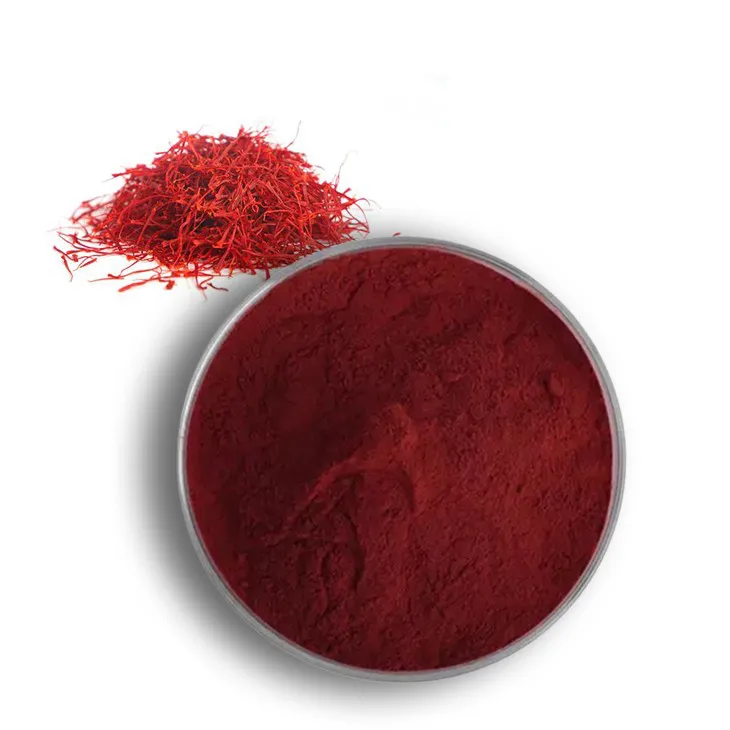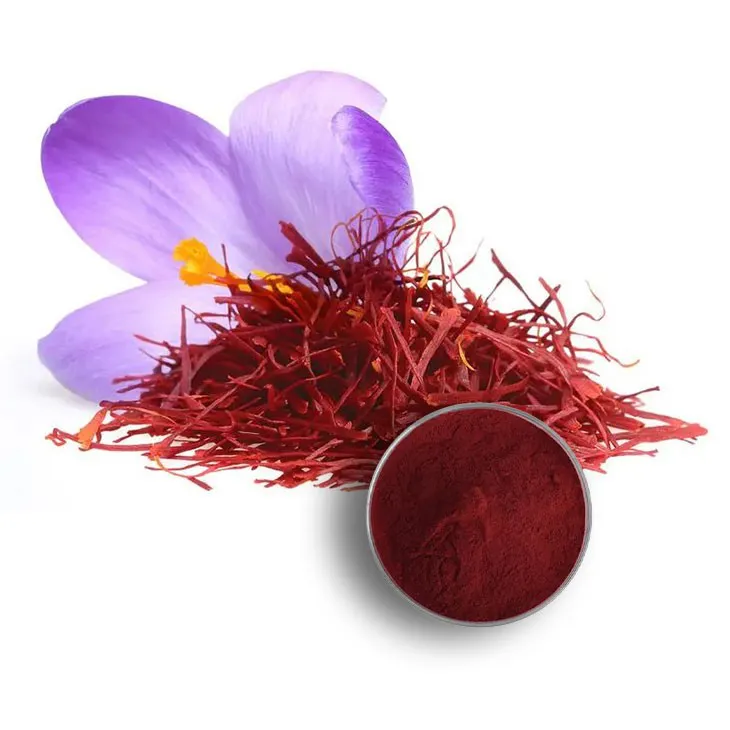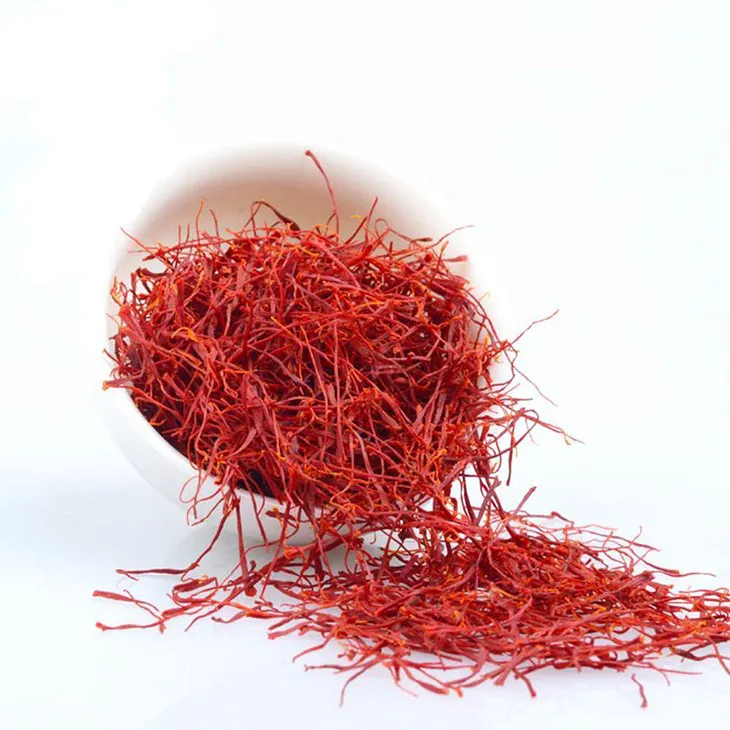- 0086-571-85302990
- sales@greenskybio.com
Extract saffron extract powder by steam distillation.
2024-11-28

1. Introduction
Saffron, known as the "red gold," is one of the most precious and expensive spices in the world. It is derived from the dried stigmas of the Crocus sativus flower. The extraction of Saffron Extract Powder has been a subject of great interest, and steam distillation is one of the prominent methods used for this purpose. This method not only capitalizes on the unique characteristics of saffron but also offers a range of benefits in various industries.

2. Saffron's Characteristics Relevant to Steam Distillation
2.1 Volatile Compounds
Saffron contains a variety of volatile compounds such as safranal, which is responsible for its characteristic aroma. These volatile components are relatively easily separated by steam distillation. The steam acts as a carrier, allowing the volatile compounds to be carried away from the saffron matrix. When the steam comes into contact with the saffron stigmas, it loosens and extracts these aromatic compounds. For example, safranal has a low boiling point, and under the influence of steam, it vaporizes and can be collected for further processing into the extract powder.
2.2 Chemical Stability
Saffron has a certain degree of chemical stability that allows it to withstand the conditions of steam distillation. The heat and moisture involved in the process do not cause significant degradation of its active components. This is crucial as it ensures that the resulting extract powder retains the beneficial properties of saffron. The stability is due in part to the complex chemical structure of saffron components, which includes flavonoids, carotenoids, and other compounds that are not easily broken down during the relatively gentle process of steam distillation.

3. The Steam Distillation Process
3.1 Preparation of Saffron
Before steam distillation, the saffron stigmas need to be carefully prepared. They are usually dried to a certain moisture content. This drying process helps in preserving the saffron and also affects the efficiency of the subsequent distillation. The dried saffron is then ground into a fine powder or left in its whole stigma form, depending on the specific requirements of the distillation setup.
3.2 The Distillation Apparatus
A typical steam distillation apparatus consists of a still, a condenser, and a collection vessel. The still is where the saffron and the steam are brought into contact. The steam is generated either externally and then introduced into the still or generated within the still itself. The condenser is used to cool the vaporized mixture of steam and saffron compounds, causing them to condense back into a liquid form. The collection vessel is where the condensed liquid, which contains the saffron extract, is collected.
3.3 The Distillation Procedure
- Steam is introduced into the still containing the saffron. The steam should be at an appropriate temperature and pressure. Too high a temperature may cause unwanted chemical reactions, while too low a temperature may not be sufficient to extract the volatile compounds effectively.
- As the steam passes through the saffron, it picks up the volatile compounds. The mixture of steam and saffron compounds then rises and enters the condenser.
- In the condenser, the vapor is cooled, and the resulting liquid, which is a mixture of water and saffron extract, is collected in the collection vessel.
- The collected liquid may then be further processed to separate the water from the saffron extract. This can be done through methods such as evaporation or using a separating funnel.

4. Factors Influencing the Extraction
4.1 Temperature
Temperature plays a crucial role in steam distillation of Saffron Extract Powder. As mentioned earlier, an optimal temperature range needs to be maintained. If the temperature is too low, the extraction of volatile compounds will be incomplete. For example, safranal may not vaporize fully, resulting in a lower yield of the desired extract. On the other hand, if the temperature is too high, it can lead to the degradation of some of the heat - sensitive components in saffron, such as certain flavonoids. A temperature range of around 100 - 120°C has been found to be effective in most cases, but this may vary depending on the specific characteristics of the saffron and the distillation apparatus.
4.2 Pressure
Pressure also affects the steam distillation process. Higher pressure can increase the boiling point of the steam, which in turn can influence the extraction efficiency. However, excessive pressure can also cause problems such as equipment damage. Maintaining a stable and appropriate pressure is essential for a successful extraction. In general, a slightly elevated pressure above atmospheric pressure can enhance the extraction process, but careful monitoring and control are required.
4.3 Duration of Distillation
The length of time for which the distillation is carried out is another important factor. A longer distillation time may seem to increase the yield of the extract, but it also runs the risk of over - extraction. Over - extraction can lead to the extraction of unwanted compounds or the degradation of the desired ones. A typical distillation time for saffron can range from 2 - 6 hours, depending on the amount of saffron, the efficiency of the apparatus, and the desired quality of the extract powder.
5. Significance in Different Industries
5.1 Food Industry
In the food industry, Saffron Extract Powder obtained by steam distillation is highly valued. It is used as a natural flavoring agent in a variety of products. Saffron's unique flavor and aroma can enhance the taste of dishes such as paella, risotto, and various desserts. The extract powder can be added in small quantities to these food items, providing a consistent and convenient way to impart the saffron flavor. Moreover, saffron is also known for its antioxidant properties, which can contribute to the preservation and nutritional value of food products.
5.2 Cosmetic Industry
The cosmetic industry utilizes saffron extract powder for its numerous skin - benefiting properties. Saffron contains compounds that have anti - inflammatory and antioxidant effects. In skincare products, such as creams, lotions, and masks, the saffron extract powder can help in reducing inflammation, fighting free radicals, and improving the overall complexion. Steam - distilled saffron extract powder is preferred in this industry as it is relatively pure and free from contaminants, ensuring the safety and effectiveness of the cosmetic products.
5.3 Pharmaceutical Industry
In the pharmaceutical industry, saffron has been studied for its potential medicinal properties. The extract powder obtained through steam distillation may contain active compounds that could be used in the development of drugs. For example, some studies suggest that saffron may have antidepressant properties. The extraction method needs to be carefully controlled to ensure that the active components are preserved and can be further investigated for pharmaceutical applications.
6. Conclusion
Steam distillation is a valuable method for extracting saffron extract powder. It takes advantage of saffron's characteristics such as its volatile compounds and chemical stability. By carefully controlling factors like temperature, pressure, and distillation duration, a high - quality extract powder can be obtained. The significance of this extract powder in the food, cosmetic, and pharmaceutical industries cannot be overstated. As research continues, there is potential for further optimization of the steam distillation process and the discovery of new applications for saffron extract powder.
FAQ:
Question 1: What are the main characteristics of saffron that make steam distillation a suitable extraction method?
Saffron contains volatile compounds that can be effectively separated and extracted through steam distillation. Its delicate chemical composition, including various aroma - and flavor - related components, can be preserved during this process. The hydrophobic nature of some of its key compounds also makes them amenable to separation by steam distillation.
Question 2: What factors can influence the efficiency of steam distillation in extracting saffron extract powder?
Several factors play a role. The temperature and pressure during steam distillation are crucial. If the temperature is too high, it may damage some of the delicate components in saffron. The duration of distillation also matters; too short a time may result in incomplete extraction, while too long can lead to degradation. The quality and particle size of the saffron used can also impact the extraction efficiency, as finer particles may offer more surface area for the steam to interact with.
Question 3: How is the saffron extract powder obtained after steam distillation?
After steam distillation, the vapor containing the extracted components from saffron is condensed. The resulting liquid is then further processed, often through methods such as drying. This drying process can involve techniques like freeze - drying or vacuum drying to convert the liquid into a powder form, which is the saffron extract powder.
Question 4: In which industries is saffron extract powder obtained by steam distillation most significant?
The food and beverage industry is one of the main beneficiaries. Saffron extract powder can be used as a natural flavoring agent and colorant in various products. In the cosmetics industry, it is valued for its antioxidant properties and potential benefits for skin health. Additionally, in the pharmaceutical industry, it may be studied for its potential medicinal properties, such as anti - inflammatory effects.
Question 5: Are there any potential drawbacks or limitations to using steam distillation for saffron extract powder extraction?
Yes, there are some limitations. Steam distillation can be an energy - intensive process, which may increase the cost of production. There is also a risk of losing some of the heat - sensitive or water - soluble components during the process. Moreover, the equipment required for steam distillation can be expensive and complex to operate and maintain.
Related literature
- Steam Distillation of Saffron: Optimization of Process Parameters"
- "The Chemistry of Saffron and Its Significance in Steam - Distillation - Based Extract Production"
- "Saffron Extract Powder: Industrial Applications of Steam - Distilled Extracts"
- ▶ Hesperidin
- ▶ Citrus Bioflavonoids
- ▶ Plant Extract
- ▶ lycopene
- ▶ Diosmin
- ▶ Grape seed extract
- ▶ Sea buckthorn Juice Powder
- ▶ Fruit Juice Powder
- ▶ Hops Extract
- ▶ Artichoke Extract
- ▶ Mushroom extract
- ▶ Astaxanthin
- ▶ Green Tea Extract
- ▶ Curcumin
- ▶ Horse Chestnut Extract
- ▶ Other Product
- ▶ Boswellia Serrata Extract
- ▶ Resveratrol
- ▶ Marigold Extract
- ▶ Grape Leaf Extract
- ▶ New Product
- ▶ Aminolevulinic acid
- ▶ Cranberry Extract
- ▶ Red Yeast Rice
- ▶ Red Wine Extract
-
Green Tea Extract
2024-11-28
-
Sugarcane Extract
2024-11-28
-
Eyebright Extract
2024-11-28
-
Honeysuckle Pollen
2024-11-28
-
Alisma Extract
2024-11-28
-
Alfalfa Meal
2024-11-28
-
Baicalin
2024-11-28
-
Genistein
2024-11-28
-
Polygonum multiflorum extract
2024-11-28
-
Milk Thistle Extract
2024-11-28





















